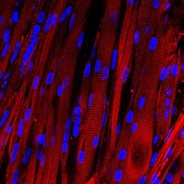 By Claire Wiggins Scientists at Duke have successfully produced live muscle cells, the first of their kind in the research world. Although muscle cell culture is frequently used experimentally, these human muscle cells respond to electrical impulses, drugs, and other forms of biochemical signaling just like muscles cells in a living organism. These muscle cells contract and respond to the outside stimuli in a way more similar to natural muscle cells than ever before. The main use of this lab-generated muscle tissue is to serve as a guinea pig for developing drugs as opposed to living beings. "The beauty of this work is that it can serve as a test bed for clinical trials in a dish," explained Dr. Nenad Bursac, professor of biomedical engineering at Duke. "We are working to test drugs' efficacy and safety without jeopardizing a patient's health and also to reproduce the functional and biochemical signals of diseases, especially rare ones and those that make taking muscle biopsies difficult." Bursac and his associates have made a huge stride towards personalized medicine. Perhaps in the future, patients will be able to supply some myogenic precursor cells, or cells that are past the stem cell stage but have yet to have developed into muscle tissue, and allow doctors or scientists to grow these cells on a 3D scaffold supplied with nutrients. This way, treatments could be tested on the laboratory-grown cells until the best treatment method is determined for that individual. Article Link: http://www.sciencedaily.com/releases/2015/01/150113154025.htm
0 Comments
Leave a Reply. |
WELCOME, UMICH SCIENTISTAS!
CAMPUS PICS
WHAT'S NEWUPCOMING EVENTSPAST POSTS
October 2022
SORT BY TAG |
The Scientista Foundation, Inc. All Rights Reserved © 2011-2021 | Based in NY | [email protected]
The Network for Pre-Professional Women in Science and Engineering
The Scientista Foundation is a registered 501(c)(3) -- Donate!
The Network for Pre-Professional Women in Science and Engineering
The Scientista Foundation is a registered 501(c)(3) -- Donate!


 RSS Feed
RSS Feed